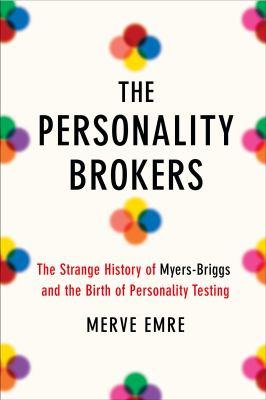
The personality brokers : the strange history of Myers-Briggs and the birth of personality testing
Available Copies by Location
| Location | |
|---|---|
| Stamford | Available |
Browse Related Items
- ISBN: 9780345812209
- Physical Description xxii, 307 pages : illustrations ; 25 cm
- Publisher [Place of publication not identified] : [publisher not identified], 2018.
Content descriptions
| Bibliography, etc. Note: | Includes bibliographical references and index. |
Additional Information

Kirkus Review
The Personality Brokers : The Strange History of Myers-Briggs and the Birth of Personality Testing
Kirkus Reviews
Copyright (c) Kirkus Reviews, used with permission.
An illuminating dual biography of two women who invented a hugely popular personality test.The Myers-Briggs Type Indicator is still widely used by businesses, schools, churches, and the military. Although it has no scientific credibility, it incited a vogue for self-assessment questionnaires proliferating in popular magazines, online dating sites, and self-help books, offering a means of "self-discovery as a civilizing form of self-mastery." Los Angeles Review of Books senior humanities editor Emre (English/Oxford Univ.; Paraliterary: The Making of Bad Readers in Postwar America, 2017, etc.) has dug deeply into published and archival sources to produce a deft, gracefully written account of Katharine Briggs (1875-1968) and her daughter, Isabel Myers (1897-1980), ardent devotees of Carl Jung who created, tested, and promoted a lengthy questionnaire that, they insisted, revealed an individual's true, innate, unchanging personality type. Influenced by Jung's Psychological Types (1921), they devised a rubric that identified personality according to four "easy to understand and easily relatable" categories: extravert or introvert, thinking or feeling, sensing or intuiting, judging or perceiving. Katharine's early interest in personality shaped her "Obedience-Curiosity" method of raising her daughter: Disobedience was punished by slaps and drills, obedience rewarded by stories, and curiosity encouragedas long as it did not lead to disobedience. Occasionally, Isabel attended school, although Katharine derided the "rapidly democratizing public-school system." Katharine's unconventional method attracted enough attention that she was asked to write magazine articles expounding on child-rearing advice. By 1923, with her daughter grown and married, Katharine sank into depression, alleviated by her discovery of Jung, for whom she developed an intense, even erotic, passion. As she delved into his work, she came to believe "that knowing one's type could save the soul of an individual while prompting him to assume the specialized offices that would help him advance civilization." Emre traces the intersection of the Briggs-Myers inventory with widespread interest in personality that involved prominent psychologists, sociologists, businessmen, college admissions officers, and researchers eager to find tools for measuring character and capability.A discerning history of the quest for self-knowledge. Copyright Kirkus Reviews, used with permission.

Publishers Weekly Review
The Personality Brokers : The Strange History of Myers-Briggs and the Birth of Personality Testing
Publishers Weekly
(c) Copyright PWxyz, LLC. All rights reserved
Emre (Paraliteracy), an associate English professor at Oxford University, tells the fascinating story of the origins of the world's most widely used personality test, the Myers-Briggs Personality Inventory (MBPI.) The MBPI, which was introduced in 1943, classifies personality in terms of four polarities: introversion-extraversion, intuition-sensing, feeling-thinking, and judging-perceiving. Emre profiles each of its developers, Katharine Cook Briggs and her daughter, Isabel Briggs Myers, noting neither possessed any formal psychological training. She also observes that for Briggs, personality "typing" was a kind of "personal religion" inspired by her near-reverential regard for Carl Jung's theories, while for Myers, who developed the MBPI's first 117-question multiple choice test, it was more of a vocation and, later, a business. In a major omission, Emre never discusses, or even delineates, the 16 personality types derived from the MBPI. However, she is excellent at recounting how the MBPI began to sweep American institutions in the 1950s-Brown University administered it to all 950 members of the class of 1958-and attained widespread popularity after its creators' deaths. Emre's fine study balances some sharp criticisms, such as from social theorist Theodor Adorno, with her own candid testimonial to the MBPI's effectiveness; in the process she restores Briggs and Myers to their rightful place in the annals of popular psychology. (Sept.) © Copyright PWxyz, LLC. All rights reserved.

BookList Review
The Personality Brokers : The Strange History of Myers-Briggs and the Birth of Personality Testing
Booklist
From Booklist, Copyright (c) American Library Association. Used with permission.
This combined dual biography and social history seeks explanations for why an admittedly flawed, unscientifically proven personality test created in the 1920s by a mother-daughter team of two untrained pseudointellectuals continues to be the most revered personality indicator in existence. Many readers may remember their own results from having taken the Myers-Briggs Type Indicator, a written evaluation that sorts individuals according to four realms. Oxford professor Emre's readable account documents how complicated family relationships, Katharine Briggs' lifelong obsession with Karl Jung, and her daughter Isabel Briggs-Myers' shameless self-promotion and willingness to pursue any opportunity (training spies in World War II, ferreting out communist sympathizers, or seeking validation through publicized affiliation with celebrities, beatniks, hippies, and West Coast new agers) turned the Myers-Briggs into the most widely administered personality indicator, still endorsed today by major international industries and the U.S. government. The human race has been seeking personal validation since the early Greeks (know thyself); this eye-opening account gives readers insight into how one evaluation method morphed into a neat, satisfying packaging system for our complicated psyches.--Kathleen McBroom Copyright 2018 Booklist


